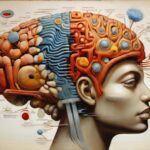
Anthropomorphizing, a behavior rooted in history, involves assigning human-like qualities to entities beyond the human realm, including objects, animals, or natural phenomena.
This tendency serves as a method for comprehending our surroundings and is a prevalent means through which humans perceive and engage with their environment.
What is Anthropomorphizing Behavior?
Anthropomorphizing behavior involves assigning human-like qualities to entities that are not human.
This practice serves as a means of understanding the world around us and is a widespread approach humans use to perceive and engage with their environment.
Examples of anthropomorphizing are diverse, ranging from giving human names to storms and dressing animals in clothing to empathizing with inanimate objects perceived to possess human-like features.
- Read also: Understanding The Benefits of Externalizing Behavior in Psychology
- Read also: Exploring the Psychology of Obsessions

The Psychology Behind Why We Anthropomorphize
Anthropomorphizing is a natural aspect of human psychology, involving the tendency to attribute human-like qualities to non-human entities.
This cognitive process helps us understand and connect with the world around us.
Rooted in our innate desire for meaning and connection, anthropomorphizing is a way of making the unfamiliar more relatable.
It’s linked to our social nature, serving as a means to forge connections and relationships with non-human entities.
By imbuing objects, animals, or phenomena with human characteristics, we create a shared understanding and extend our capacity for empathy beyond the human sphere.
Ultimately, anthropomorphizing reflects our complex interplay of cognitive, social, and emotional processes in navigating the intricacies of the world.
Examples of Anthropomorphizing
Anthropomorphizing can take many forms, and people often anthropomorphize in different ways. Some examples of anthropomorphizing include:
- Giving human names to storms: Providing human names to storms personifies them, making them more relatable and understandable.
- Dressing animals in clothing: Dressing animals in clothing is a common way of attributing human-like qualities to our pets, enhancing our connection with them.
- Empathizing with inanimate objects: Some individuals empathize with inanimate objects they perceive as having human-like features, attributing emotions or intentions to them.
- Treating machines as if they have minds: Humans often interact with technology, like cars, computers, and machines, as if they possess cognitive abilities or intentions.
- Attributing human qualities to spirits or other entities: Anthropomorphizing extends to spiritual beliefs, where human qualities are ascribed to spirits or other entities, fostering a sense of connection.
Potential Advantages and Disadvantages of Anthropomorphization
Anthropomorphizing isn’t always detrimental. For instance, it may improve your well-being by creating a sense of comfort and connectedness.
Advantages
Enhanced well-being
Anthropomorphizing can contribute positively to well-being by creating a sense of comfort and connectedness.
Assigning human-like qualities to pets or objects can foster a feeling of companionship, reducing feelings of loneliness.
Emotional connection
By anthropomorphizing, individuals often develop a stronger emotional connection with animals, objects, or natural phenomena.
This emotional bond can lead to a more fulfilling and enriched human experience.
Increased empathy
Anthropomorphizing extends our capacity for empathy beyond the human realm.
Treating non-human entities as if they have feelings or intentions can enhance our understanding and compassion for the diverse forms of life around us.
Disadvantages
Unrealistic expectations
Anthropomorphizing may lead to unrealistic expectations, especially when applied to non-human entities.
Expecting animals or objects to behave as humans can create confusion and disappointment when they do not meet these expectations.
Harm to animals
While the intent may be positive, anthropomorphizing companion animals can lead to unintended harm.
For example, attributing human emotions to pets might result in overfeeding, leading to health issues such as obesity.
Misinterpretation of behavior
Anthropomorphizing can potentially cloud our judgment when interpreting the behavior of non-human entities.
Applying human motivations to animals or objects may hinder our understanding of their natural instincts and needs.

Is Anthropomorphism Healthy?
Anthropomorphizing is not inherently unhealthy, but it carries potential disadvantages that warrant consideration.
It’s crucial to discern when anthropomorphizing might pose risks and to exercise caution in such instances.
For instance, anthropomorphizing wild animals can lead to perilous situations, as it may cause individuals to underestimate the dangers associated with interacting with them.
Therefore, while anthropomorphism can offer benefits, it’s important to approach it mindfully and be aware of its potential drawbacks, particularly in contexts where safety and understanding are paramount.
- Read also: How the Body Remembers Trauma
- Read also: Coprophagia in Humans: Understanding the Uncommon Habit
Conclusion
Engaging in anthropomorphism, the act of assigning human-like qualities to non-human entities, is a prevalent human behavior.
It serves as a lens through which we perceive and interact with the world, offering both potential advantages and disadvantages.
Delving into the psychology behind anthropomorphizing provides valuable insights into the intricate dynamics of human behavior and its intricate connection with the environment.
In recognizing the multifaceted nature of this behavior, we gain a deeper understanding of how humans navigate their surroundings and establish connections with the diverse elements of the world.
FAQs
Anthropomorphizing is the act of attributing human-like qualities to non-human things, such as objects, animals, or phenomena.
It is a way of projecting our own emotions, thoughts, and behaviors onto non-human things, allowing us to better understand and relate to the world around us.
Anthropomorphizing isn’t inherently unhealthy, but it can have potential disadvantages. It is essential to recognize when anthropomorphizing may be harmful and to avoid it in those situations.


